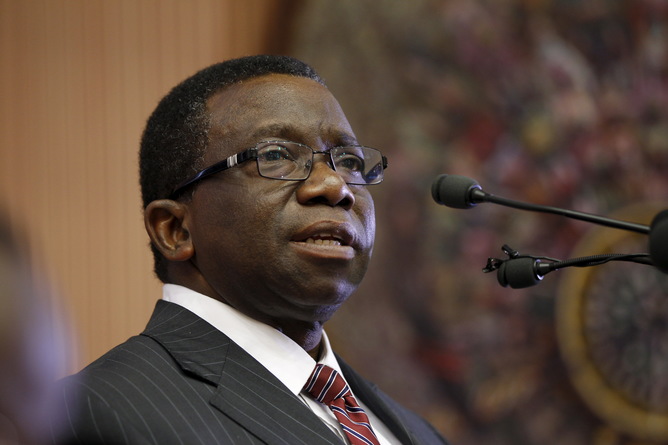by Usman Alabi
Analysis
The Minister of Health , Prof. Isaac Adewole said this on Monday in Abuja at the sideline of the public presentation of the 2017 budget proposals.
He said about N51bn has been proposed for health infrastructure development in 2017, part of which would be dedicated to implementing the new National Health Policy. He said that the policy would focus on strengthening primary healthcare centres and encouraging states to strengthen secondary healthcare centres while the Federal Government focused on the tertiary teaching hospitals in the country.
According to him, “In the last 12 months, we have seen the rehabilitation of close to 3,000 of primary healthcare centres. This was done from both internal funding and funding from development partners.
“In 2017, we intend to continue to support primary care. In addition to this, we intend to take more people away from tertiary hospitals.
“Many Nigerians go to tertiary hospitals for any kind of ailment, be it headache, fever, diarrhea they go to national hospitals. That is not where they ought to go.
“They should go to the primary healthcare facility close to them. So we will de-congest the tertiary hospitals so that they can attend to serious cases such as cancer, heart disease among others”.
According to him, the N12bn is not enough, but with the private sector the goal for the year would be achieved.
But the fact still remains that Nigeria does not have a comprehensive health policy, and if what we have is close to one, then we do not have the political will to bring it to reality. There is no doubting the fact that our primary health care system is working and worth emulating all over the world. I could actually testify to this because I have benefited from it.
But apart from this we have not come to realize or see the health sector as something that can go beyond giving healthcare for the populace but as a sector that is capable of generating foreign exchange for the country, even as our politicians spend huge amount of money on foreign trips in search of good health care, something they are unable to provide back home.
This is what has brought India, and even our African neighbour, South Africa to the Limelight. Places where our policy makers willingly visit at any slight health inconvenience even if it is at the expense of our own health infrastructure.
The irony of it is that we have the Human capital, we have qualified and well trained medical professionals, but the issue is the unavailability of necessary infrastructure and paucity of capital to stimulate the necessary drive in the health sector.
It is amazing that we cannot effectively carry out heart surgery and other complex surgeries not because we do not have the brains but because we don’t have the health infrastructures needed for such complex operation, and apart from this we do not have trust in our health sector.
Hence, we need a truely comprehensive health policy with requisite political will to drive change in the health sector, comprehensive in the sense that it must carry along every aspect of the country. There are two major sector that if well invested in as the capacity to generate more revenue for the system. The education and the health sector, a government that genuinely cares about its people is a government that is concerned about their health and well being.
It is high time, the government began to take initiatives, build trust in the health sector by also compelling public office holders to treat themselves in the country, and by investing heavily in the sector, not only stop at this but also ensure that every kobo invested is used for the purpose it is meant for, This should be done continuously and replicated at other levels of government. There is no problem if a state in the country heavily invest in health infrastructure to stimulate revenue generation for itself, and as well drive what is called health tourism.
But eventually if we must achieve our intended goal for the health sector, we must think outside the box, be very original in our approach and come out with a health sector development blue print that is peculiar to us as a country which has the capacity of becoming a standard for others to follow.
